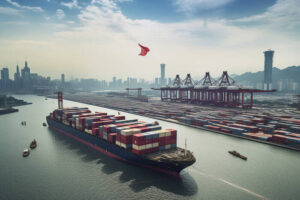The Shifting Landscape of Global Trade: Insights from Extreme Investor Network
In a rapidly evolving global economic environment, Malaysia’s Prime Minister Anwar Ibrahim recently underscored the nation’s intent to enhance cooperation with China amidst a backdrop of rising unilateralism. In his statements, he emphasized that ASEAN (the Association of Southeast Asian Nations) would not support any unilateral imposition of tariffs and aims to strengthen collective resilience through cooperation, which is crucial for sustaining economic growth in a volatile market.
China’s Strategic Moves and Global Relations
Adding to the intrigue, Chinese Premier Xi Jinping made a noteworthy state visit to Vietnam, sparking discussions around potential BRICS membership for Vietnam. This move, coupled with strengthened ties with key exporters, indicates a strategic play by China to bolster its economic standing while also making inroads with the EU. These developments are crucial as they may play a significant role in helping China mitigate the impacts of US-imposed tariffs.
The Myth of Isolation: What Analysts Are Saying
Political commentator Brian Tyler Cohen highlighted a critical perspective on the narrative of China’s isolation. He pointed out that while many view China as being marginalized internationally, reports indicate that countries like Japan and South Korea are actively negotiating trade deals with China, and the EU is even eliminating tariffs on Chinese electric vehicles (EVs). This observation reinforces a vital truth — it may not be China that is being isolated, but rather a miscalibration of the narrative surrounding its global relations.
Negotiations Amidst Hostility
Despite the increasing tensions in the US-China trade war, it seems that China is extending an olive branch. David Ingles, the Chief Markets Editor for Bloomberg TV Asia Pacific, noted that China’s willingness to engage in negotiations has often been overlooked. The insistence on being treated with respect in these discussions is a crucial point for investors and market observers alike, as it suggests that a diplomatic resolution may still be within reach if both parties can approach negotiations more constructively.
Economist Shen Jianguang echoed this sentiment on Bloomberg TV, asserting that China is waiting for the US to recognize that the ongoing trade war has detrimental effects on both economies. This waiting game signals potential market volatility, creating opportunities for savvy investors to capitalize on discrepancies in market performance.
Divergences in US-Hong Kong Markets
This juxtaposition of diplomatic maneuvering and market responses is evident in the divergent performances of US and Hong Kong markets. Following a warning from Fed Chair Powell about tariffs slowing growth and inciting inflation, US markets took a hit on April 16. The Dow and the S&P 500 declined by 1.73% and 2.24%, respectively, while the Nasdaq Composite saw a steeper dip of 3.07%.
In stark contrast, the Hang Seng Index rallied by 1.62% in early trading the next day, propelling its year-to-date (YTD) gains to an impressive 6.67%. Despite the ongoing trade war, Hong Kong’s market momentum suggests that local economic policies and stimuli may provide a buffer against global uncertainties. Meanwhile, the Shanghai Composite Index, while down 4.14% YTD, shows a less severe response compared to the Nasdaq, which has plummeted 15.55% YTD.
Brian Tycangco, an editor and analyst at Stansberry Research, observed this phenomenon, noting that Hong Kong’s indices could be a harbinger of a broader market decoupling. This potential trend raises important questions for investors: How can one capitalize on these changes? How can an understanding of China’s stimulus measures inform investment strategies?
Takeaway: Strategic Positioning During Turbulent Times
The nuances of these shifting global dynamics reveal potential opportunities for investors who can navigate the complexities of international trade relations. At Extreme Investor Network, we advocate for a proactive approach to investment, ensuring our readers are well-equipped with insights and analyses that reveal where the market might be heading. As the economic landscape continues to evolve, staying informed and adaptable will be key.
Keeping an eye on emerging trends, such as the interactions between ASEAN countries and China, as well as the shifting dynamics in US and Hong Kong markets, can provide investors with the strategic advantage needed to thrive in uncertain times.
Be sure to follow us for more in-depth analysis and unique insights that can help you make informed decisions in the stock market. Your journey towards becoming an extreme investor starts here.

